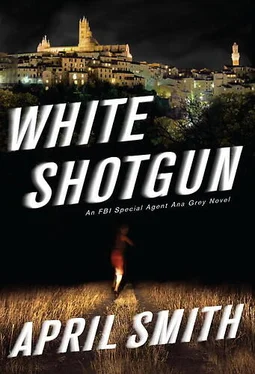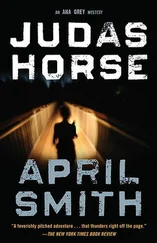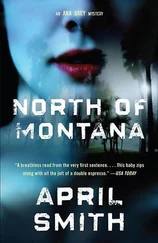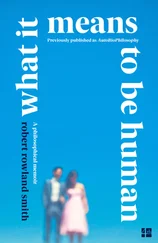April Smith - White Shotgun
Здесь есть возможность читать онлайн «April Smith - White Shotgun» весь текст электронной книги совершенно бесплатно (целиком полную версию без сокращений). В некоторых случаях можно слушать аудио, скачать через торрент в формате fb2 и присутствует краткое содержание. Год выпуска: 2011, ISBN: 2011, Жанр: Триллер, на английском языке. Описание произведения, (предисловие) а так же отзывы посетителей доступны на портале библиотеки ЛибКат.
- Название:White Shotgun
- Автор:
- Жанр:
- Год:2011
- ISBN:978-0-307-59679-6
- Рейтинг книги:4 / 5. Голосов: 1
-
Избранное:Добавить в избранное
- Отзывы:
-
Ваша оценка:
- 80
- 1
- 2
- 3
- 4
- 5
White Shotgun: краткое содержание, описание и аннотация
Предлагаем к чтению аннотацию, описание, краткое содержание или предисловие (зависит от того, что написал сам автор книги «White Shotgun»). Если вы не нашли необходимую информацию о книге — напишите в комментариях, мы постараемся отыскать её.
White Shotgun — читать онлайн бесплатно полную книгу (весь текст) целиком
Ниже представлен текст книги, разбитый по страницам. Система сохранения места последней прочитанной страницы, позволяет с удобством читать онлайн бесплатно книгу «White Shotgun», без необходимости каждый раз заново искать на чём Вы остановились. Поставьте закладку, и сможете в любой момент перейти на страницу, на которой закончили чтение.
Интервал:
Закладка:
It is disorienting to be inside a parade instead of protecting it, to be the focus of dazed tourists backed into doorways, nobody understanding what in hell is going on. It’s the folks in modern dress who look out of place, because the contrada procession dominates the streets, sweeping forward with the force of absolute commitment that carries the tall, elongated Palio banner through history to the church. A new one is commissioned each year from a local artist. This one is a bright abstract of the virgin, with multicolored garlands trailing like the tails of fanciful horses.
There are a couple of relaxed-looking provincial cops in light blue shirts with epaulets — and, if worst came to worst, those guys with the spears. Is it possible there is one spot on earth where there is no need for security or suspicion of petty thievery, kidnapping, or terrorist attack? If so it must be here and now, at eleven in the morning, along this sun-kissed stone passageway thronged with believers, where the smells of deeply cooked complex sauces for the celebration lunch are beginning to drift through the aqua shutters of kitchen windows, where ghosts of ancient arches are still visible in the brickwork, and where plants grow arrogantly out of the walls.
Finally, giving in to the spirit, I march downhill to the rhythm of the drums, ending up in Piazza Provenzano, a small square facing the white façade of Santa Maria church. The doors are wide open and the procession keeps pushing inside, a giant traffic jam, as the parishes of each contrada enter behind their alfieri and tamburinos.
The church has simple smooth white walls and is filled with light. In the apse, a golden altar is topped with mosaics and covered with flowers. The moment we enter, a change comes over Cecilia. Never mind that the pews are overflowing, and the atmosphere is as rowdy as a ball game — this is a sacred space that is obviously a deep comfort. It seems natural for her to make the transition from the outside world, murmuring prayers without the slightest self-consciousness.
Sensing my curiosity, she tries to explain. “I am asking for help. I believe it will come.” “Me, too,” I say, although I have no idea what I’m talking about. Help? From where? To do what? Make all of it just go away?
Cecilia and I stay close, but we have lost sight of Nicosa and Sofri in the multitude. I can’t help snapping pictures on my phone. It’s like being inside a wedding cake — round pillars of butterscotch marble topped with creamy rosettes, framing giant oil paintings of lessons and miracles. As more and more people crowd in, Cecilia and I are crushed beside a rack of gowns where altar boys are suiting up. It is touching to see their young faces full of self-importance, but my eye is caught by a single nun in white — older, head bowed, a point of stillness in the pressing crowd.
At last the Palio banner enters and the church erupts with shouts and drums.
Cecilia cries, “Touch it for luck. Go! Go!” Pushing toward the center aisle as the banner is slogged through, reaching with mad ardor like everybody else — shouldering past gray-haired ladies and wide-eyed children, all of us greedy for a touch of magic — I cannot stretch my fingers far enough to reach the cloth, but then I am an outsider; why should I share in their good fortune? The banner continues toward the altar, where it will be blessed by an archbishop dressed in red and white lace. I snap a photo of the nun, a quiet eddy in the current, fingers curled against her fuzzy chin, eyes peering through smudged glasses. I envy her tranquillity.
“Is it too late to become a nun?” I whisper to Cecilia. But Cecilia doesn’t answer, because she is no longer there.
SIXTEEN
Expelled from the church into the steamy square, the crush disperses slowly, contradaioli gathering in knots of animated conversation. It is easy to spot Sofri standing with a group of older men, also wearing Oca scarves, all of them smoking and talking at once.
Sofri says something that causes the others to nod with approving smiles.
“I told them you are my niece from America,” he says.
I feel a blush of pleasure. “I’m touched. Do I call you zio?” I say, dragging up the word for “uncle.” “ Zio, sure.” Sofri grins. “Molto bène!”
“Where is Cecilia?” “I don’t know. You don’t see her?” We gaze over the crowd fanning out along the many streets leading out of the piazza. Tourists are still gathered, watching the spectacle of citizens in soft velvet hats and suede tunics chatting in front of motorbikes and smart cars.
“She was standing right next to me in church.” “Maybe she got a call and went outside to hear better,” Sofri says, pointing helpfully to his ear.
Looking more closely at the clusters of ladies (the men and women have separated themselves like iron filings on a magnet) I see nobody in an emerald suit with a mountain of auburn hair.
“Maybe the call was about Giovanni? Maybe something happened.” Sofri speed-dials the abbey and speaks to the nurse.
“The nurse says they did not call her. It is still possible Cecilia went home.” “Is Giovanni all right?” “He has a slight fever. The nurse is not concerned.” “How could Cecilia go home?” I wonder. “We have the car.” Nicosa, looking confident and at ease, is shaking hands with the archbishop, whose vibrant crimson and lace just knock you out in the sunshine. When His Excellency moves away, Sofri calls Nicosa over, asking questions in Italian, to which Nicosa shakes his head and shows his car keys, indicating that his wife could not have driven away. The square outside Santa Maria church is now empty. The tide has gone out, and there is no trace of Cecilia. Scanning the roofs and windows, I see only a Jack Russell terrier on a balcony, lustily pulling the leaves off a potted basil plant.
Squinting through the smoke of a cigarette, Nicosa tries her cell. No answer. He looks at his watch.
I ask, “What was the plan?” “Meet outside the church,” he replies impatiently. “Have lunch at the café. They are expecting us.” “She must already be there,” Sofri decides. “Or at the contrada headquarters, cooking up a masterpiece for tomorrow night. Wait until you see the food these women put out.” She wouldn’t be cooking, not in that suit.
“She’s punishing me for the unpleasantness in the car,” Nicosa says. “It’s all Ana’s fault.” He smiles and squeezes my shoulder. “I am kidding. We are friends, right?” “Of course.” “ Mangiamo! Let’s eat!” I go with the men of Nicosa’s circle, trooping back to Oca territory, where all the stores are bustling. Frequently they stop en masse to shake hands and kiss their brethren, everyone reciting hopes for a good outcome in Monday’s race.
Finally we come to a small square with a church and a fountain — the fountain where Cecilia was baptized into the contrada for life. Unlike the flashy store in the Rome train station, the original Caffè Nicosa, where Nicosa’s father started out as a coffee roaster, is a hole-in-the-wall — chipped plaster peeling away from the brick, a potted tree by the entrance, no sign, no menu, just a framed picture from Italian Vogue showing Nicosa and Cecilia looking very glam in the courtyard of the abbey. I picture her inside with her jacket off, wearing just the sexy chemise she had on under the suit, chatting and holding a glass of wine, a shrewd look aimed at the beaded curtain at the door, sights fixed and ready for her husband’s entrance.
But the crowd has overflowed the street, and we can barely get inside. It is impossible to hear in the din of talk and laughter, or to move in any direction without the herculean effort of asking people to suck it in and step aside. “Mi scusi,” I keep breathing, wedging sideways, looking for Cecilia by randomly working my way in and out of the pack, blind as a worm. The place has that deep divine coffee smell, not just the brew of it, but the layered heart and soul of it, blackberry and chocolate. In view is the original roaster, an iron contraption of drums, ovens, pipes, and gauges painted bright red. They still roast here, every day, and the concentrated aroma rising off the tarry mountains of beans is as cool and seductive as tones off Coltrane’s sax.
Читать дальшеИнтервал:
Закладка:
Похожие книги на «White Shotgun»
Представляем Вашему вниманию похожие книги на «White Shotgun» списком для выбора. Мы отобрали схожую по названию и смыслу литературу в надежде предоставить читателям больше вариантов отыскать новые, интересные, ещё непрочитанные произведения.
Обсуждение, отзывы о книге «White Shotgun» и просто собственные мнения читателей. Оставьте ваши комментарии, напишите, что Вы думаете о произведении, его смысле или главных героях. Укажите что конкретно понравилось, а что нет, и почему Вы так считаете.












